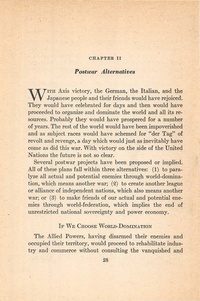This Earth One Country/Postwar alternatives
The text below this notice was generated by a computer, it still needs to be checked for errors and corrected. If you would like to help, view the original document by clicking the PDF scans along the right side of the page. Click the edit button at the top of this page (notepad and pencil icon) or press Alt+Shift+E to begin making changes. When you are done press "Save changes" at the bottom of the page. |
CHAPTER II
Postwar Alternatives
rH Axis victory, the German, the Italian, and the
Japanese people and their friends would have rejoiced. They would have celebrated for days and then would have proceeded to organize and dominate the world and all its resources. Probably they would have prospered for a number of years. The rest of the world would have been impoverished and as subject races would have schemed for “der Tag” of revolt and revenge, a day which would just as inevitably have come as did this war. With victory on the side of the United Nations the future is not so clear.
Several postwar projects have been proposed or implied. All of these plans fall within three alternatives: (1) to paralyze all actual and potential enemies through world-domination, which means another war; (2) to create another league or alliance of independent nations, which also means another war; or (3) to make friends of our actual and potential enemies through world-federation, which implies the end of unrestricted national sovereignty and power economy.
Ir We Cxoost Wortp-DomMINATION
The Allied Powers, having disarmed their enemies and occupied their territory, would proceed to rehabilitate industry and commerce without consulting the vanquished and
28
[Page 29]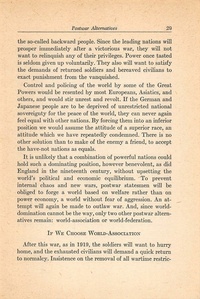 Postwar Alternatives 3205
Postwar Alternatives 3205
the so-called backward people. Since the leading nations will prosper immediately after a victorious war, they will not want to relinquish any of their privileges. Power once tasted is seldom given up voluntarily. They also will want to satisfy the demands of returned soldiers and bereaved civilians to exact punishment from the vanquished.
Control and policing of the world by some of the Great Powers would be resented by most Europeans, Asiatics, and others, and would stir unrest and revolt. If the German and Japanese people are to be deprived of unrestricted national sovereignty for the peace of the world, they can never again feel equal with other nations. By forcing them into an inferior position we would assume the attitude of a superior race, an attitude which we have repeatedly condemned. There is no other solution than to make of the enemy a friend, to accept the have-not nations as equals.
It is unlikely that a combination of powerful nations could hold such a dominating position, however benevolent, as did England in the nineteenth century, without upsetting the world’s political and economic equilibrium. To prevent internal chaos and new wars, postwar statesmen will be obliged to forge a world based on welfare rather than on power economy, a world without fear of aggression. An attempt will again be made to outlaw war. And, since worlddomination cannot be the way, only two other postwar alternatives remain: world-association or world-federation.
Ir We Cuoost Worup-ASssociaTION
After this war, as in 1919, the soldiers will want to hurry
home, and the exhausted civilians will demand a quick return
to normalcy. Insistence on the removal of all wartime restric[Page 30]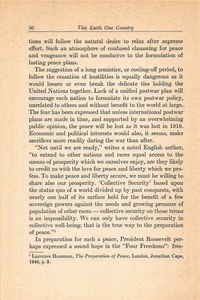 30 e This Earth ‘One Country —
30 e This Earth ‘One Country —
tions will follow the natural desire to relax after supreme effort. Such an atmosphere of confused clamoring for peace and vengeance will not be conducive to the formulation of lasting peace plans.
The suggestion of a long armistice, or cooling-off period, to follow the cessation of hostilities is equally dangerous as it would loosen or even break the delicate ties holding the United Nations together. Lack of a unified postwar plan will encourage each nation to formulate its own postwar policy, unrelated to others and without benefit to the world at large. The fear has been expressed that unless international postwar plans are made in time, and supported by an overwhelming public opinion, the peace will be lost as it was lost in 1919. Economic and political interests would also, it seems, make sacrifices more readily during the war than after.
“Not until we are ready,” writes a noted English author, “to extend to other nations and races equal access to the means of prosperity which we ourselves enjoy, are they likely to credit us with the love for peace and liberty which we profess. To make peace and liberty secure, we must be willing to share also our prosperity. ‘Collective Security’ based upon — the status quo of a world divided up by past conquests, with nearly one half of its surface held for the benefit of a few sovereign powers against the needs and growing pressure of population of other races — collective security on those terms is an impossibility. We can only have collective security in collective well-being; that is the true way to the preparation of peace.”?
In preparation for such a peace, President Roosevelt perhaps expressed a sound hope in the “Four Freedoms”: free
- Laurence Housman, The Preparation of Peace, London, Jonathan Cape,
1940, p. 9.
[Page 31]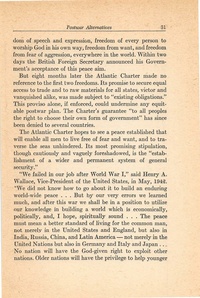 Postwar Alternatives -8) 7
dom of speech and expression, freedom of every person to
worship God in his own way, freedom from want, and freedom
from fear of aggression, everywhere in the world. Within two
days the British Foreign Secretary announced his Government’s acceptance of this peace aim.
Postwar Alternatives -8) 7
dom of speech and expression, freedom of every person to
worship God in his own way, freedom from want, and freedom
from fear of aggression, everywhere in the world. Within two
days the British Foreign Secretary announced his Government’s acceptance of this peace aim.
But eight months later the Atlantic Charter made no reference to the first two freedoms. Its promise to secure equal access to trade and to raw materials for all states, victor and vanquished alike, was made subject to “existing obligations.” This proviso alone, if enforced, could undermine any equitable postwar plan. The Charter’s guarantee “to all peoples the right to choose their own form of government” has since been denied to several countries.
The Atlantic Charter hopes to see a peace established that will enable all men to live free of fear and want, and to traverse the seas unhindered. Its most promising stipulation, though cautiously and vaguely foreshadowed, is the “establishment of a wider and permanent system of general security.”
“We failed in our job after World War I,” said Henry A.
Wallace, Vice-President of the United States, in May, 1942.
“We did not know how to go about it to build an enduring
world-wide peace . . . But by our very errors we learned
much, and after this war we shall be in a position to utilize
our knowledge in building a world which is economically,
politically, and, I hope, spiritually sound . . . The peace
must mean a better standard of living for the common man,
not merely in the United States and England, but also in
India, Russia, China, and Latin America — not merely in the
United Nations but also in Germany and Italy and Japan...
No nation will have the God-given right to exploit other
nations. Older nations will have the privilege to help younger
[Page 32]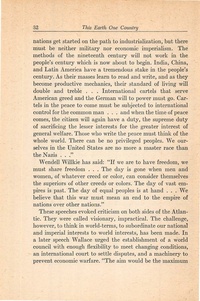 ~
~
32 This Earth One Country .
nations get started on the path to industrialization, but there must be neither military nor economic imperialism. The methods of the nineteenth century will not work in the people’s century which is now about to begin. India, China, and Latin America have a tremendous stake in the people’s century. As their masses learn to read and write, and as they become productive mechanics, their standard of living will double and treble . . . International cartels that serve American greed and the German will to power must go. Cartels in the peace to come must be subjected to international control for the common man . . . and when the time of peace comes, the citizen will again have a duty, the supreme duty of sacrificing the lesser interests for the greater interest of general welfare. Those who write the peace must think of the whole world. There can be no privileged peoples. We ourselves in the United States are no more a master race than the Nazis .. .”
Wendell Willkie has said: “If we are to have freedom, we — must share freedom ... The day is gone when men and women, of whatever creed or color, can consider themselves the superiors of other creeds or colors. The day of vast empires is past. The day of equal peoples is at hand .. . We believe that this war must mean an end to the empire of nations over other nations.”
These speeches evoked criticism on both sides of the Atlantic. They were called visionary, impractical. The challenge,
however, to think in world-terms, to subordinate our national
and imperial interests to world interests, has been made. In
a later speech Wallace urged the establishment of a world
council with enough flexibility to meet changing conditions,
an international court to settle disputes, and a machinery to
prevent economic warfare. “The aim would be the maximum
[Page 33]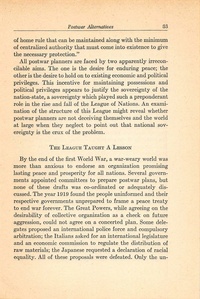 Postwar Alternatives 83
Postwar Alternatives 83
of home rule that can be maintained along with the minimum of centralized authority that must come into existence to give the necessary protection.”
All postwar planners are faced by two apparently irreconcilable aims. The one is the desire for enduring peace; the other is the desire to hold on to existing economic and political privileges. This incentive for maintaining possessions and political privileges appears to justify the sovereignty of the nation-state, a sovereignty which played such a preponderant role in the rise and fall of the League of Nations. An examination of the structure of this League might reveal whether postwar planners are not deceiving themselves and the world at large when they neglect to point out that national sovereignty is the crux of the problem.
Tur Leacut Taucut A Lesson
By the end of the first World War, a war-weary world was
more than anxious to endorse an organization promising
lasting peace and prosperity for all nations. Several governments appointed committees to prepare postwar plans, but
none of these drafts was co-ordinated or adequately discussed. The year 1919 found the people uninformed and their
respective governments unprepared to frame a peace treaty
to end war forever. The Great Powers, while agreeing on the
desirability of collective organization as a check on future
aggression, could not agree on a concerted plan. Some delegates proposed an international police force and compulsory
arbitration; the Italians asked for an international legislature
and an economic commission to regulate the distribution of
raw materials; the Japanese requested a declaration of racial
equality. All of these proposals were defeated. Only the un[Page 34]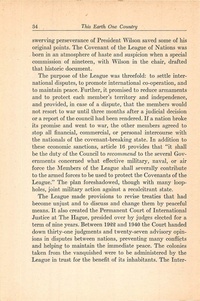 *
*
Soa This Earth One Country
swerving perseverance of President Wilson saved some of his original points. The Covenant of the League of Nations was _ born in an atmosphere of haste and suspicion when a special commission of nineteen, with Wilson in the chair, drafted that historic document.
The purpose of the League was threefold: to settle international disputes, to promote international co-operation, and to maintain peace. Further, it promised to reduce armaments and to protect each member’s territory and independence, and provided, in case of a dispute, that the members would not resort to war until three months after a judicial decision or a report of the council had been rendered. If a nation broke its promise and went to war, the other members agreed to stop all financial, commercial, or personal intercourse with the nationals of the covenant-breaking state. In addition to these economic sanctions, article 16 provides that “it shall be the duty of the Council to recommend to the several Goyernments concerned what effective military, naval, or air force the Members of the League shall severally contribute to the armed forces to be used to protect the Covenants of the League.” The plan foreshadowed, though with many loopholes, joint military action against a recalcitrant state.
The League made provisions to revise treaties that had
become unjust and to discuss and change them by peaceful
means. It also created the Permanent Court of International
Justice at The Hague, presided over by judges elected for a
term of nine years. Between 1922 and 1940 the Court handed
down thirty-one judgments and twenty-seven advisory opinions in disputes between nations, preventing many conflicts
and helping to maintain the immediate peace. The colonies
taken from the vanquished were to be administered by the
League in trust for the benefit of its inhabitants. The Inter[Page 35]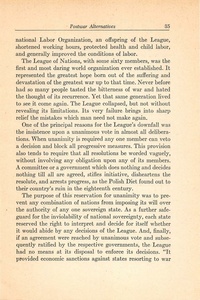 - Postwar Alternatives 85
- Postwar Alternatives 85
national Labor Organization, an offspring of the League, shortened working hours, protected health and child labor, and generally improved the conditions of labor.
The League of Nations, with some sixty members, was the first and most daring world organization ever established. It represented the greatest hope born out of the suffering and devastation of the greatest war up to that time. Never before had so many people tasted the bitterness of war and hated the thought of its recurrence. Yet that same generation lived to see it come again. The League collapsed, but not without revealing its limitations. Its very failure brings into sharp relief the mistakes which man need not make again.
One of the principal reasons for the League’s downfall was the insistence upon a unanimous vote in almost all deliberations. When unanimity is required any one member can veto a decision and block all progressive measures. This provision also tends to require that all resolutions be worded vaguely, without involving any obligation upon any of its members. A committee or a government which does nothing and decides nothing till all are agreed, stifles initiative, disheartens the resolute, and arrests progress, as the Polish Diet found out to their country’s ruin in the eighteenth century.
The purpose of this reservation for unanimity was to prevent any combination of nations from imposing its will over
the authority of any one sovereign state. As a further safeguard for the inviolability of national sovereignty, each state
reserved the right to interpret and decide for itself whether
it would abide by any decisions of the League. And, finally,
if an agreement were reached by unanimous vote and subsequently ratified by the respective governments, the League
had no means at its disposal to enforce its decisions. “It
provided economic sanctions against states resorting to war
[Page 36]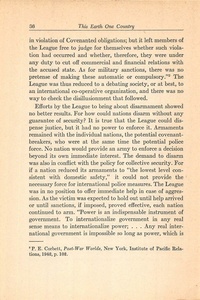 36 This Earth One Country
36 This Earth One Country
\
in violation of Covenanted obligations; but it left members of the League free to judge for themselves whether such violation had occurred and whether, therefore, they were under any duty to cut off commercial and financial relations with the accused state. As for military sanctions, there was no pretense of making these automatic or compulsory.” The League was thus reduced to a debating society, or at best, to an international co-operative organization, and there was no way to check the disillusionment that followed.
Efforts by the League to bring about disarmament showed no better results. For how could nations disarm without any guarantee of security? It is true that the League could dispense justice, but it had no power to enforce it. Armaments remained with the individual nations, the potential covenantbreakers, who were at the same time the potential police force. No nation would provide an army to enforce a decision beyond its own immediate interest. The demand to disarm was also in conflict with the policy for collective security. For if a nation reduced its armaments to “the lowest level consistent with domestic safety,” it could not provide the necessary force for international police measures. The League was in no position to offer immediate help in case of aggression. As the victim was expected to hold out until help arrived or until sanctions, if imposed, proved effective, each nation continued to arm. “Power is an indispensable instrument of government. To internationalize government in any real sense means to internationalize power; . . . Any real international government is impossible so long as power, which is
2P_E. Corbett, Post-War Worlds, New York, Institute of Pacific Relations, 1942, p. 102.
[Page 37]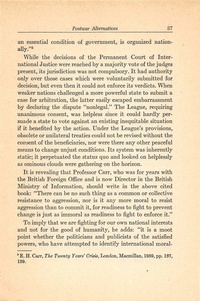 j
j
Postwar Alternatives 87
an essential condition of government, is organized nationally.’
While the decisions of the Permanent Court of International Justice were reached by a majority vote of the judges present, its jurisdiction was not compulsory. It had authority only over those cases which were voluntarily submitted for decision, but even then it could not enforce its verdicts. When weaker nations challenged a more powerful state to submit a case for arbitration, the latter easily escaped embarrassment by declaring the dispute “nonlegal.” The League, requiring unanimous consent, was helpless since it could hardly persuade a state to vote against an existing inequitable situation if it benefited by the action. Under the League’s provisions, obsolete or unilateral treaties could not be revised without the consent of the beneficiaries, nor were there any other peaceful means to change unjust conditions. Its system was inherently static; it perpetuated the status quo and looked on helplessly as ominous clouds were gathering on the horizon.
It is revealing that Professor Carr, who was for years with the British Foreign Office and is now Director in the British Ministry of Information, should write in the above cited book: “There can be no such thing as a common or collective resistance to aggression, nor is it any more moral to resist aggression than to commit it, for readiness to fight to prevent change is just as immoral as readiness to fight to enforce it.”
To imply that we are fighting for our own national interests and not for the good of humanity, he adds: “it is a moot point whether the politicians and publicists of the satisfied powers, who have attempted to identify international moral
°K. H. Carr, The Twenty Years’ Crisis, London, Macmillan, 1939, pp. 187,
139. ;
[Page 38]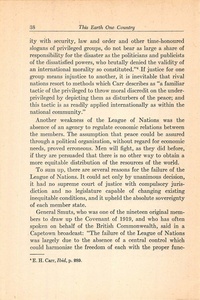 88 This Earth One Country
88 This Earth One Country
ity with security, law and order and other time-honoured slogans of privileged groups, do not bear as large a share of responsibility for the disaster as the politicians and publicists of the dissatisfied powers, who brutally denied the validity of an international morality so constituted.”* If justice for one group means injustice to another, it is inevitable that rival nations resort to methods which Carr describes as “a familiar tactic of the privileged to throw moral discredit on the underprivileged by depicting them as disturbers of the peace; and this tactic is as readily applied internationally as within the national community.”
Another weakness of the League of Nations was the absence of an agency to regulate economic relations between the members. The assumption that peace could be assured through a political organization, without regard for economic needs, proved erroneous. Men will fight, as they did before, if they are persuaded that there is no other way to obtain a more equitable distribution of the resources of the world.
To sum up, there are several reasons for the failure of the League of Nations. It could act only by unanimous decision, it had no supreme court of justice with compulsory jurisdiction and no legislature capable of changing existing inequitable conditions, and it upheld the absolute sovereignty of each member state.
General Smuts, who was one of the nineteen original members to draw up the Covenant of 1919, and who has often spoken on behalf of the British Commonwealth, said in a Capetown broadcast: “The failure of the League of Nations was largely due to the absence of a central control which could harmonize the freedom of each with the proper func
- E. H. Carr, Ibid, p. 289.
[Page 39]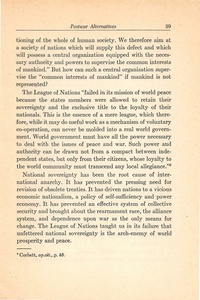 Postwar Alternatives 89
Postwar Alternatives 89
tioning of the whole of human society. We therefore aim at a society of nations which will supply this defect and which will possess a central organization equipped with the necessary authority and powers to supervise the common interests of mankind.” But how can such a central organization supervise the “common interests of mankind” if mankind is not represented?
The League of Nations “failed in its mission of world peace because the states members were allowed to retain their sovereignty and the exclusive title to the loyalty of their nationals. This is the essence of a mere league, which therefore, while it may do useful work as a mechanism of voluntary co-operation, can never be molded into a real world government. World government must have all the power necessary to deal with the issues of peace and war. Such power and authority can be drawn not from a compact between independent states, but only from their citizens, whose loyalty to the world community must transcend any local allegiance.”
National sovereignty has been the root cause of international anarchy. It has prevented the pressing need for revision of obsolete treaties. It has driven nations to a vicious economic nationalism, a policy of self-sufficiency and power economy. It has prevented an effective system of collective security and brought about the rearmament race, the alliance system, and dependence upon war as the only means for change. The League of Nations taught us in its failure that unfettered national sovereignty is the arch-enemy of world prosperity and peace.
” Corbett, op.cit., p. 48.
[Page 40]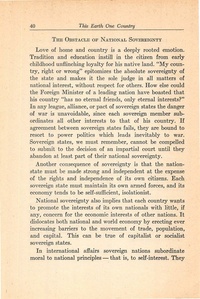 40 This Earth One Country
40 This Earth One Country
Tur Osstacite or NATIONAL SOVEREIGNTY
Love of home and country is a deeply rooted emotion. Tradition and education instill in the citizen from early childhood unflinching loyalty for his native land. “My country, right or wrong” epitomizes the absolute sovereignty of the state and makes it the sole judge in all matters of national interest, without respect for others. How else could the Foreign Minister of a leading nation have boasted that his country “has no eternal friends, only eternal interests?” In any league, alliance, or pact of sovereign states the danger of war is unavoidable, since each sovereign member subordinates all other interests to that of his country. If agreement between sovereign states fails, they are bound to resort to power politics which leads inevitably to war. Sovereign states, we must remember, cannot be compelled to submit to the decision of an impartial court until they abandon at least part of their national sovereignty.
Another consequence of sovereignty is that the nationstate must be made strong and independent at the expense of the rights and independence of its own citizens. Each sovereign state must maintain its own armed forces, and its economy tends to be self-sufficient, isolationist.
National sovereignty also implies that each country wants to promote the interests of its own nationals with little, if any, concern for the economic interests of other nations. It _ dislocates both national and world economy by erecting ever increasing barriers to the movement of trade, population, and capital. This can be true of capitalist or socialist sovereign states.
In international affairs sovereign nations subordinate
moral to national principles — that is, to self-interest. They
[Page 41]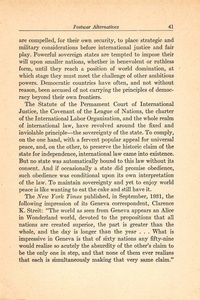 Postwar Alternatives Al
Postwar Alternatives Al
are compelled, for their own security, to place strategic and military considerations before international justice and fair play. Powerful sovereign states are tempted to impose their will upon smaller nations, whether in benevolent or ruthless form, until they reach a position of world domination, at | which stage they must meet the challenge of other ambitious powers. Democratic countries have often, and not without reason, been accused of not carrying the principles of democracy beyond their own frontiers.
The Statute of the Permament Court of International Justice, the Covenant of the League of Nations, the charter of the International Labor Organization, and the whole realm of international law, have revolved around the fixed and inviolable principle—the sovereignty of the state. To comply, on the one hand, with a fervent popular appeal for universal peace, and, on the other, to preserve the historic claim of the state for independence, international law came into existence. But no state was automatically bound to this law without its consent. And if occasionally a state did promise obedience, ‘such obedience was conditional upon its own interpretation of the law. To maintain sovereignty and yet to enjoy world peace is like wanting to eat the cake and still have it.
The New York Times published, in September, 1931, the
following impression of its Geneva correspondent, Clarence
K. Streit: “The world as seen from Geneva appears an Alice
in Wonderland world, devoted to the propositions that all
nations are created superior, the part is greater than the
whole, and the day is longer than the year . . . What is
impressive in Geneva is that of sixty nations any fifty-nine
would realize so acutely the absurdity of the other’s claim to
be the only one in step, and that none of them ever realizes
that each is simultaneously making that very same claim.”
[Page 42]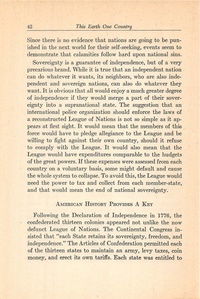 42 This Earth One Country
42 This Earth One Country
Since there is no evidence that nations are going to be punished in the next world for their self-seeking, events seem to demonstrate that calamities follow hard upon national sins.
Sovereignty is a guarantee of independence, but of a very precarious brand. While it is true that an independent nation can do whatever it wants, its neighbors, who are also independent and sovereign nations, can also do whatever they want. It is obvious that all would enjoy a much greater degree of independence if they would merge a part of their sovereignty into a supranational state. The suggestion that an international police organization should enforce the laws of a reconstructed League of Nations is not so simple as it appears at first sight. It would mean that the members of this force would have to pledge allegiance to the League and be willing to fight against their own country, should it refuse to comply with the League. It would also mean that the League would have expenditures comparable to the budgets of the great powers. If these expenses were assessed from each country on a voluntary basis, some might default and cause the whole system to collapse. To avoid this, the League would need the power to tax and collect from each member-state, and that would mean the end of national sovereignty.
AMERICAN History Proviwrs A Kry
Following the Declaration of Independence in 1776, the
confederated thirteen colonies appeared not unlike the now
defunct League of Nations. The Continental Congress insisted that “each State retains its sovereignty, freedom, and
independence.” The Articles of Confederation permitted each
of the thirteen states to maintain an army, levy taxes, coin
money, and erect its own tariffs. Each state was entitled to
[Page 43]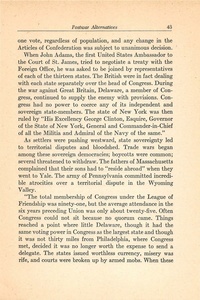 Postwar Alternatives 43
Postwar Alternatives 43
one vote, regardless of population, and any change in the Articles of Confederation was subject to unanimous decision. —
When John Adams, the first United States Ambassador to the Court of St. James, tried to negotiate a treaty with the Foreign Office, he was asked to be joined by representatives of each of the thirteen states. The British were in fact dealing with each state separately over the head of Congress. During the war against Great Britain, Delaware, a member of Congress, continued to supply the enemy with provisions. Congress had no power to coerce any of its independent and sovereign state-members. The state of New York was then ruled by “His Excellency George Clinton, Esquire, Governor of the State of New York, General and Commander-in-Chief of all the Militia and Admiral of the Navy of the same.”
As settlers were pushing westward, state sovereignty led to territorial disputes and bloodshed. Trade wars began among these sovereign democracies; boycotts were common; several threatened to withdraw. The fathers of Massachusetts complained that their sons had to “reside abroad” when they went to Yale. The army of Pennsylvania committed incredible atrocities over a territorial dispute in the Wyoming Valley.
“The total membership of Congress under the League of
Friendship was ninety-one, but the average attendance in the
six years preceding Union was only about twenty-five. Often
Congress could not sit because no quorum came. Things
reached a point where little Delaware, though it had the
same voting power in Congress as the largest state and though
it was not thirty miles from Philadelphia, where Congress
met, decided it was no longer worth the expense to send a
delegate. The states issued worthless currency, misery was
rife, and courts were broken up by armed mobs. When these
[Page 44]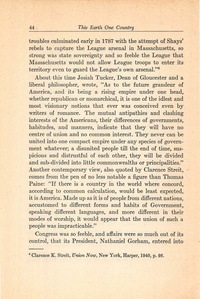 44, This Earth One Country
44, This Earth One Country
troubles culminated early in 1787 with the attempt of Shays’ rebels to capture the League arsenal in Massachusetts, so strong was state sovereignty and so feeble the League that Massachusetts would not allow League troops to enter its territory even to guard the League’s own arsenal.”®
About this time Josiah Tucker, Dean of Gloucester and a liberal philosopher, wrote, “As to the future grandeur of America, and its being a rising empire under one head, whether republican or monarchical, it is one of the idlest and most visionary notions that ever was conceived even by writers of romance. The mutual antipathies and clashing interests of the Americans, their differences of governments, habitudes, and manners, indicate that they will have no centre of union and no common interest. They never can be united into one compact empire under any species of government whatever; a disunited people till the end of time, suspicious and distrustful of each other, they will be divided and sub-divided into little commonwealths or principalities.” Another contemporary view, also quoted by Clarence Streit, comes from the pen of no less notable a figure than Thomas Paine: “If there is a country in the world where concord, according to common calculation, would be least expected, it is America. Made up as it is of people from different nations, accustomed to different forms and habits of Government, speaking different languages, and more different in their modes of worship, it would appear that the union of such a people was impracticable.”
‘Congress was so feeble, and affairs were so much out of its control, that its President, Nathaniel Gorham, entered into
- Clarence K. Streit, Union Now, New York, Harper, 1940, p. 26.
[Page 45]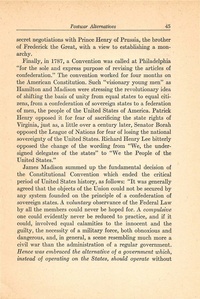 Postwar Alternatives 45
Postwar Alternatives 45
secret negotiations with Prince Henry of Prussia, the brother of Frederick the Great, with a view to establishing a monarchy.
Finally, in 1787, a Convention was called at Philadelphia “for the sole and express purpose of revising the articles of confederation.” The convention worked for four months on the American Constitution. Such “visionary young men” as Hamilton and Madison were stressing the revolutionary idea of shifting the basis of unity from equal states to equal citizens, from a confederation of sovereign states to a federation of men, the people of the United States of America. Patrick Henry opposed it for fear of sacrificing the state rights of Virginia, just as, a little over a century later, Senator Borah opposed the League of Nations for fear of losing the national sovereignty of the United States. Richard Henry Lee bitterly opposed the change of the wording from “We, the undersigned delegates of the states” to “We the People of the United States.”
James Madison summed up the fundamental decision of
the Constitutional Convention which ended the critical
period of United States history, as follows: “It was generally
agreed that the objects of the Union could not be secured by
any system founded on the principle of a confederation of
sovereign states. A voluntary observance of the Federal Law
by all the members could never be hoped for. A compulsive
one could evidently never be reduced to practice, and if it
could, involved equal calamities to the innocent and the
guilty, the necessity of a military force, both obnoxious and
dangerous, and, in general, a scene resembling much more a
civil war than the administration of a regular government.
Hence was embraced the alternative of a government which,
instead of operating on the States, should operate without
[Page 46]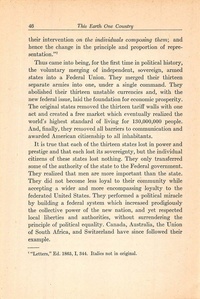 46 This Earth One Country
46 This Earth One Country
their intervention on the individuals composing them; and hence the change in the principle and proportion of representation.”
Thus came into being, for the first time in political history, the voluntary merging of independent, sovereign, armed states into a Federal Union. They merged their thirteen separate armies into one, under a single command. They abolished their thirteen unstable currencies and, with the new federal issue, laid the foundation for economic prosperity. The original states removed the thirteen tariff walls with one act and created a free market which eventually realized the world’s highest standard of living for 130,000,000 people. And, finally, they removed all barriers to communication and awarded American citizenship to all inhabitants.
It is true that each of the thirteen states lost in power and prestige and that each lost its sovereignty, but the individual citizens of these states lost nothing. They only transferred some of the authority of the state to the Federal government. They realized that men are more important than the state. They did not become less loyal to their community while accepting a wider and more encompassing loyalty to the federated United States. They performed a political miracle by building a federal system which increased prodigiously the collective power of the new nation, and yet respected local liberties and authorities, without surrendering the principle of political equality. Canada, Australia, the Union of South Africa, and Switzerland have since followed their example.
7*Tetters,” Ed. 1865, I, 344. Italics not in original.
[Page 47]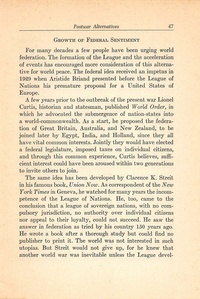 Postwar Alternatives AT
Postwar Alternatives AT
GrowtH OF FEDERAL SENTIMENT
For many decades a few people have been urging world federation. The formation of the League and the acceleration of events has encouraged more consideration of this alternative for world peace. The federal idea received an impetus in 1929 when Aristide Briand presented before the League of Nations his premature proposal for a United States of Europe.
A few years prior to the outbreak of the present war Lionel Curtis, historian and statesman, published World Order, in which he advocated the submergence of nation-states into a world-commonwealth. As a start, he proposed the federation of Great Britain, Australia, and New Zealand, to be joined later by Egypt, India, and Holland, since they all have vital common interests. Jointly they would have elected a federal legislature, imposed taxes on individual citizens, and through this common experience, Curtis believes, sufiicient interest could have been aroused within two generations to invite others to join.
The same idea has been developed by Clarence K. Streit
in his famous book, Union Now. As correspondent of the New
York Times in Geneva, he watched for many years the incompetence of the League of Nations. He, too, came to the
conclusion that a league of sovereign nations, with no compulsory jurisdiction, no authority over individual citizens
nor appeal to their loyalty, could not succeed. He saw the
answer in federation as tried by his country 150 years ago.
He wrote a book after a thorough study but could find no
publisher to print it. The world was not interested in such
utopias. But Streit would not give up, for he knew that
another world war was inevitable unless the League devel[Page 48]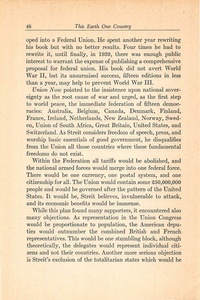 48 This Earth One Country
48 This Earth One Country
oped into a Federal Union. He spent another year rewriting his book but with no better results. Four times he had to rewrite it, until finally, in 1939, there was enough public interest to warrant the expense of publishing a comprehensive proposal for federal union. His book did not avert World War II, but its unsurmised success, fifteen editions in less than a year, may help to prevent World War III.
Union Now pointed to the insistence upon national sovereignty as the root cause of war and urged, as the first step to world peace, the immediate federation of fifteen democracies: Australia, Belgium, Canada, Denmark, Finland, France, Ireland, Netherlands, New Zealand, Norway, Sweden, Union of South Africa, Great Britain, United States, and Switzerland. As Streit considers freedom of speech, press, and worship basic essentials of good government, he disqualifies from the Union all those countries where these fundamental freedoms do not exist.
Within the Federation all tariffs would be abolished, and the national armed forces would merge into one federal force. There would be one currency, one postal system, and one citizenship for all. The Union would contain some 250,000,000 people and would be governed after the pattern of the United States. It would be, Streit believes, invulnerable to attack, and its economic benefits would be immense.
While this plan found many supporters, it encountered also
many objections. As representation in the Union Congress
would be proportionate to population, the American deputies would outnumber the combined British and French
representatives. This would be one stumbling block, although
theoretically, the delegates would represent individual citizens and not their countries. Another more serious objection
is Streit’s exclusion of the totalitarian states which would be
[Page 49]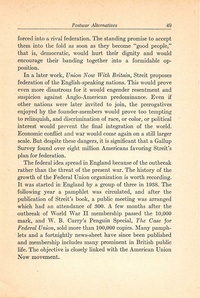
Postwar Alternatives 49
forced into a rival federation. The standing promise to accept them into the fold as soon as they become “good people,” that is, democratic, would hurt their dignity and would encourage their banding together into a formidable opposition.
In a later work, Union Now With Britain, Streit proposes federation of the English-speaking nations. This would prove even more disastrous for it would engender resentment and suspicion against Anglo-American predominance. Even if other nations were later invited to join, the prerogatives enjoyed by the founder-members would prove too tempting to relinquish, and discrimination of race, or color, or political interest would prevent the final integration of the world. Economie conflict and war would come again on a still larger scale. But despite these dangers, it is significant that a Gallup Survey found over eight million Americans favoring Streit’s plan for federation.
The federal idea spread in England because of the outbreak
rather than the threat of the present war. The history of the
growth of the Federal Union organization is worth recording.
It was started in England by a group of three in 1938. The
following year a pamphlet was circulated, and after the
publication of Streit’s book, a public meeting was: arranged
which had an attendance of 300. A few months after the
outbreak of World War II membership passed the 10,000
mark, and W. B. Curry’s Penguin Special, The Case for
Federal Union, sold more than 100,000 copies. Many pamphlets and a fortnightly news-sheet have since been published
and membership includes many prominent in British public
life. The objective is closely linked with the American Union
Now movement.
[Page 50]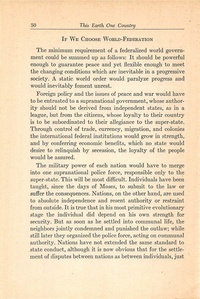 50 This Earth One Country
50 This Earth One Country
Ir We Cuoost Worup-FEepERATION
The minimum requirement of a federalized world government could be summed up as follows: It should be powerful enough to guarantee peace and yet flexible enough to meet the changing conditions which are inevitable in a progressive society. A static world order would paralyze progress and would inevitably foment unrest.
Foreign policy and the issues of peace and war would have to be entrusted to a supranational government, whose authority should not be derived from independent states, as in a league, but from the citizens, whose loyalty to their country ‘is to be subordinated to their allegiance to the super-state. Through control of trade, currency, migration, and colonies the international federal institutions would grow in strength, and by conferring economic benefits, which no state would desire to relinquish by secession, the loyalty of the people would be assured.
The military power of each nation would have to merge
into one supranational police force, responsible only to the
super-state. This will be most difficult. Individuals have been
taught, since the days of Moses, to submit to the law or
suffer the consequences. Nations, on the other hand, are used
to absolute independence and resent authority or restraint
from outside. It is true that in his most primitive evolutionary
stage the individual did depend on his own strength for
security. But as soon as he settled into communal life, the
neighbors jointly condemned and punished the outlaw; while
still later they organized the police force, acting on communal
authority. Nations have not extended the same standard to
state conduct, although it is now obvious that for the settlement of disputes between nations as between individuals, just ~
[Page 51]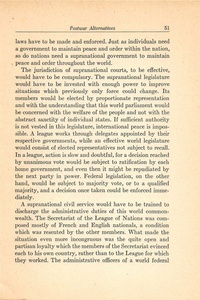 Postwar Alternatives 51
Postwar Alternatives 51
laws have to be made and enforced. Just as individuals need a government to maintain peace and order within the nation, so do nations need a supranational government to maintain peace and order throughout the world.
The jurisdiction of supranational courts, to be effective, would have to be compulsory. The supranational legislature would have to be invested with enough power to improve situations which previously only force could change. Its members would be elected by proportionate representation and with the understanding that this world parliament would be concerned with the welfare of the people and not with the abstract sanctity of individual states. If sufficient authority is not vested in this legislature, international peace is impossible. A league works through delegates appointed by their respective governments, while an effective world legislature would consist of elected representatives not subject to recall. In a league, action is slow and doubtful, for a decision reached by unanimous vote would be subject to ratification by each home government, and even then it might be repudiated by the next party in power. Federal legislation, on the other hand, would be subject to majority vote, or to a qualified majority, and a decision once taken could be enforced immediately.
A supranational civil service would have to be trained to
discharge the administrative duties of this world commonwealth. The Secretariat of the League of Nations was composed mostly of French and English nationals, a condition
which was resented by the other members. What made the
situation even more incongruous was the quite open and
partisan loyalty which the members of the Secretariat evinced
each to his own country, rather than to the League for which
they worked. The administrative officers of a world federal
[Page 52]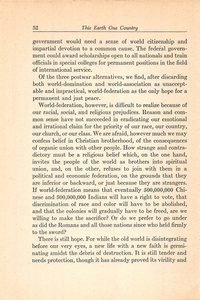 52 This Earth One Country
52 This Earth One Country
government would need a sense of world citizenship and
impartial devotion to a common cause. The federal govern ment could award scholarships open to all nationals and train
officials in special colleges for permanent positions in the field | of international service.
Of the three postwar alternatives, we find, after discarding both world-domination and world-association as unacceptable and impractical, world-federation as the only hope for a permanent and just peace.
World-federation, however, is difficult to realize because of our racial, social, and religious prejudices. Reason and common sense have not succeeded in eradicating our emotional and irrational claim for the priority of our race, our country, our church, or our class. We are afraid, however much we may confess belief in Christian brotherhood, of the consequences of organic union with other people. How strange and contradictory must be a religious belief which, on the one hand, invites the people of the world as brothers into spiritual union, and, on the other, refuses to join with them in a political and economic federation, on the grounds that they are inferior or backward, or just because they are strangers. If world-federation means that eventually 500,000,000 Chinese and 300,000,000 Indians will have a right to vote, that discrimination of race and color will have to be abolished, and that the colonies will gradually have to be freed, are we willing to make the sacrifice? Or do we prefer to go under as did the Romans and all those nations since who held firmly to the sword?
There is still hope. For while the old world is disintegrating
before our very eyes, a new life with a new faith is germinating amidst the debris of destruction. It is still tender and
needs protection, though it has already proved its virility and
[Page 53]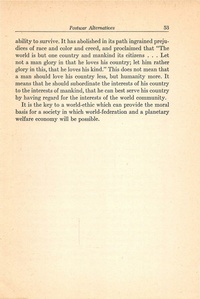 Postwar Alternatives 53
Postwar Alternatives 53
ability to survive. It has abolished in its path ingrained prejudices of race and color and creed, and proclaimed that “The world is but one country and mankind its citizens . . . Let not a man glory in that he loves his country; let him rather glory in this, that he loves his kind.” This does not mean that a man should love his country less, but humanity more. It means that he should subordinate the interests of his country to the interests of mankind, that he can best serve his country by having regard for the interests of the world community.
It is the key to a world-ethic which can provide the moral basis for a society in which world-federation and a planetary welfare economy will be possible.
